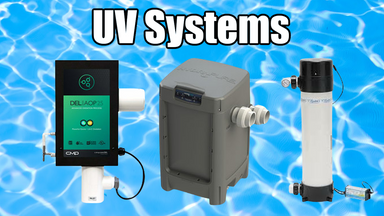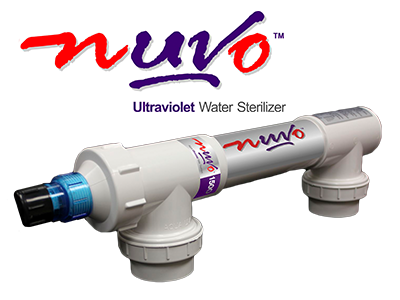Published by Matt Fichera on 03/16/2021
Chlorine Shortage 2021: UV Water Sanitizer Systems
Why are pool chlorine prices so high? Why is pool chlorine not available?
These types of questions will be asked quite a bit during the 2021 pool season and possibly beyond. During the pandemic and the resulting lockdown, both the pool and spa industries have seen unprecedented growth. This growth is a direct result of families remaining at home, unlike any time before. More people in their pools and more pools being built, combined for a very high demand for pool supplies and pool chemicals.
A very popular way to sanitize a swimming pool is through the use of trichloroisocyanuric acid or “Trichlor” for short. It’s that white powdery substance with a heavy chlorine smell. It usually comes in granular form or tablet “hockey puck” shape. It’s been used for years to get rid of bacteria and algae in swimming pools. In the times leading up to the pandemic, the 3 chlorine producers in the United States had successfully lobbied for the implementation of very high tariffs on imported chlorine. This left those 3 companies as the sole producers within the country. By the end of the 2020 pool season, all stock-piled imports had been sold and those 3 companies were struggling to meet the rise in demand. Then the fire happened.
In August of 2020, Hurricane Laura barreled down upon the Gulf Coast region hitting the city of New Orleans, Louisiana especially hard. The storm tore the roof off of a pool chemical manufacturing plant and in doing so exposed all of the product to the elements. This chemical plant specifically made chlorine for swimming pools and when you add water to chlorine in this form, it starts to break down like it’s supposed to. This is exactly what happened, but on a very large-scale, causing heat to become trapped and a fire ignited. That fire burned for 3 whole days and in the process, destroyed over 40% of the country’s supply of chlorine.
This factory is able to produce 115 million pounds of “Trichlor” per year so you can imagine the impact it’s going to have on the industry. Product loss of this amount is too much to overcome in one year with no way the other companies are able to make up the difference.
What does the chlorine shortage mean for the pool industry?
It means you are taking a product from within an industry which was already very busy and a product category that was already in high demand and removing 40% of it from the equation completely. This means both distributors and retailers should see increases in prices which is then reflected in the shelf price. Retail stores will possibly be on allotment and only able to stock and sell a specific amount of product while other brands and chlorine variations may not be available at all.
What does the chlorine shortage mean for you, the pool owner?
For you, the pool owner, the chlorine shortage means alternatives will need to be researched and learned about. Whether it’s a water treatment system that reduces chlorine or one eliminating it completely, it’s important you find something that works for you from both a cost standpoint and a health/safety standpoint. Chlorine alternative education will become more important as the gap created by the chemical fire is filled in with other methods of water treatment, helping to keep you and your family having fun in the sun this summer.
What Chlorine Alternative Options are Available?
There are many chlorine alternatives and ways to reduce chlorine within the pool and spa industry. Salt Chlorine Generators, Ozone Technology, UV Systems, Mineral Systems, Specialty Chemicals like natural enzymes, phosphate removers, algaecides, stabilizers, borates, as well as utilizing best practices to keep your pool water optimized. These practices include such things as regular water testing, brushing, and making sure you are using correct filtration.
What Do You Recommend to Reduce Chlorine Usage?
One of the options that we recommend is UV treatment. UV is eco-friendly, reduces chemicals needed, is safer for the environment, and is recognized as a second sanitizer.
UV systems use ultraviolet light to actually wipe out bacteria at a DNA level. Chlorine neutralizes pathogens and bacteria but UV systems change their DNA so they can no longer reproduce and also terminate them. Algae growth also is eliminated. The UV light is contained within the graphite housing so the water comes from the pool’s filter and then through the rays destroying bothersome algae, bacteria, viruses and everything in between.
Choosing to invest in a UV system for your pool reduces chlorine usage but doesn’t take it completely out of the equation. The pool water still needs a low chlorine residual (.5-1.0 PPM) for the UV to properly function. If you go with a UV system, you’ll want to make sure to take extra care of the bulb. Handle it gently, don’t look at it for prolonged periods, and also keep it free of any oils like from your fingertips. These can impact the system’s effectiveness. The bulb should be replaced every 2 to 5 years which will depend on its use.
We recommend UV systems from the Solaxx company for the best in pool water treatment. The Nuvo for above ground pools and they offer some great inground models as well. Read Our Product Blog for more information.







